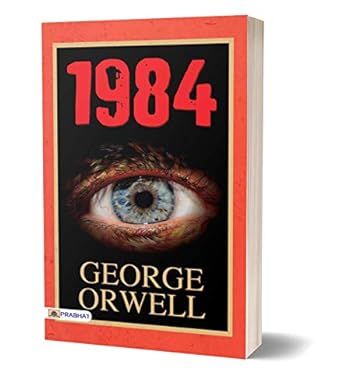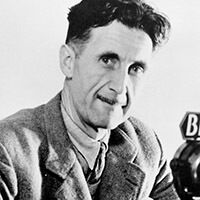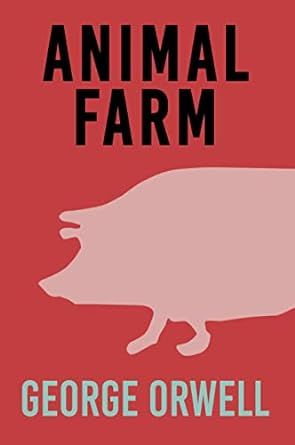1984: Nineteen Eighty-Four
4.6
-
115,526 ratings
Nineteen Eighty-Four: A Novel, often referred to as 1984, is a dystopian social science fiction novel by English novelist George Orwell. It was published on 8 June 1949 by Secker & Warburg as Orwell's ninth and final book completed in his lifetime. Thematically, Nineteen Eighty-Four centres on the consequences of totalitarianism, mass surveillance, and repressive regimentation of persons and behaviours within society.[2][3] Orwell, himself a democratic socialist, modelled the authoritarian government in the novel after Stalinist Russia. More broadly, the novel examines the role of truth and facts within politics and the ways in which they are manipulated. In the year 1984, civilization has been damaged by world war, civil conflict, and revolution. Airstrip One (formerly known as Great Britain) is a province of Oceania, one of the three totalitarian super-states that rule the world. It is ruled by the “Party” under the ideology of “Ingsoc” (a Newspeak shortening of “English Socialism") and the mysterious leader Big Brother, who has an intense cult of personality. The Party brutally purges out anyone who does not fully conform to their regime using the Thought Police and constant surveillance through Telescreens (two-way televisions), cameras, and hidden microphones. Those who fall out of favour with the Party become “unpersons", disappearing with all evidence of their existence destroyed. In London, Winston Smith is a member of the Outer Party, working at the Ministry of Truth, where he rewrites historical records to conform to the state's ever-changing version of history. Winston revises past editions of The Times, while the original documents are destroyed after being dropped into ducts leading to the memory hole. He secretly opposes the Party's rule and dreams of rebellion, despite knowing that he is already a “thoughtcriminal” and likely to be caught one day.
Eric Arthur Blair (25 June 1903 – 21 January 1950), known by his pen name George Orwell, was an English novelist, essayist, journalist and critic. His work is characterised by lucid prose, biting social criticism, opposition to totalitarianism, and outspoken support of democratic socialism.
Delve into the dystopian world of Oceania, ruled by the oppressive Party and their enigmatic leader, Big Brother, in the thought-provoking masterpiece 1984 by GEORGE ORWELL. Witness the consequences of totalitarianism, mass surveillance, and the manipulation of truth in this gripping social science fiction novel.
** Key Aspects of the Book 1984 by GEORGE ORWELL:**
- Totalitarianism and Surveillance: Explore the chilling consequences of an all-powerful government and the constant surveillance of individuals through methods like - Telescreens and hidden microphones.
- The Manipulation of Truth: Dive into the dark depths of propaganda and the Party's control over historical records, showcasing the malleability of truth for political gain.
- The Fight for Freedom: Follow Winston Smith as he grapples with his rebellious nature and navigates a world where dissent is violently suppressed. George Orwell, a democratic socialist himself, expertly crafts a thought-provoking dystopian masterpiece that continues to resonate with readers today..
Read more
Kindle
$0.99
Available instantly
Hardcover
$12.99
Paperback
$8.75
Ships from
Amazon.com
Payment
Secure transaction
ASIN
B07CRC11LH
ISBN-10
0679417397
ISBN-13
978-0679417392
Print length
384 pages
Language
English
Publisher
Everyman's Library
Publication date
November 03, 1992
Dimensions
5.24 x 1.03 x 8.29 inches
Item weight
1.14 pounds
Editorial reviews
Nineteen Eighty-Four is a remarkable book; as a virtuoso literary performance it has a sustained brilliance that has rarely been matched in other works of its genre...It is as timely as the label on a poison bottle. New York Herald Tribune
A profound, terrifying, and wholly fascinating book...Orwell s theory of power is developed brilliantly. The New Yorker
A book that goes through the reader like an east wind, cracking the skin...Such are the originality, the suspense, the speed of writing, and withering indignation that it is impossible to put the book down. V. S. Pritchett
Orwell s novel escorts us so quietly, so directly, and so dramatically from our own day to the fate which may be ours in the future, that the experience is a blood-chilling one. Saturday Review --Review
"Orwell's best-known work of unrelenting dystopian realism warns against totalitarianism." -- AudioFile
"Orwell's best-known work of unrelenting dystopian realism warns against totalitarianism." --AudioFile
Nineteen Eighty-Four is a remarkable book; as a virtuoso literary performance it has a sustained brilliance that has rarely been matched in other works of its genre...It is as timely as the label on a poison bottle. New York Herald Tribune
A profound, terrifying, and wholly fascinating book...Orwell s theory of power is developed brilliantly. The New Yorker
A book that goes through the reader like an east wind, cracking the skin...Such are the originality, the suspense, the speed of writing, and withering indignation that it is impossible to put the book down. V. S. Pritchett
Orwell s novel escorts us so quietly, so directly, and so dramatically from our own day to the fate which may be ours in the future, that the experience is a blood-chilling one. Saturday Review --Review
Read more
About the authors
George Orwell
George Orwell is one of England's most famous writers and social commentators. Among his works are the classic political satire Animal Farm and the dystopian nightmare vision Nineteen Eighty-Four. Orwell was also a prolific essayist, and it is for these works that he was perhaps best known during his lifetime. They include Why I Write and Politics and the English Language. His writing is at once insightful, poignant and entertaining, and continues to be read widely all over the world.
Eric Arthur Blair (George Orwell) was born in 1903 in India, where his father worked for the Civil Service. The family moved to England in 1907 and in 1917 Orwell entered Eton, where he contributed regularly to the various college magazines. From 1922 to 1927 he served with the Indian Imperial Police in Burma, an experience that inspired his first novel, Burmese Days (1934). Several years of poverty followed. He lived in Paris for two years before returning to England, where he worked successively as a private tutor, schoolteacher and bookshop assistant, and contributed reviews and articles to a number of periodicals. Down and Out in Paris and London was published in 1933. In 1936 he was commissioned by Victor Gollancz to visit areas of mass unemployment in Lancashire and Yorkshire, and The Road to Wigan Pier (1937) is a powerful description of the poverty he saw there.
At the end of 1936 Orwell went to Spain to fight for the Republicans and was wounded. Homage to Catalonia is his account of the civil war. He was admitted to a sanatorium in 1938 and from then on was never fully fit. He spent six months in Morocco and there wrote Coming Up for Air. During the Second World War he served in the Home Guard and worked for the BBC Eastern Service from 1941 to 1943. As literary editor of the Tribune he contributed a regular page of political and literary commentary, and he also wrote for the Observer and later for the Manchester Evening News. His unique political allegory, Animal Farm was published in 1945, and it was this novel, together with Nineteen Eighty-Four (1949), which brought him world-wide fame.
It was around this time that Orwell's unique political allegory Animal Farm (1945) was published. The novel is recognised as a classic of modern political satire and is simultaneously an engaging story and convincing allegory. It was this novel, together with Nineteen Eighty-Four (1949), which finally brought him world-wide fame. Nineteen Eighty-Four's ominous depiction of a repressive, totalitarian regime shocked contemporary readers, but ensures that the book remains perhaps the preeminent dystopian novel of modern literature.
Orwell's fiercely moral writing has consistently struck a chord with each passing generation. The intense honesty and insight of his essays and non-fiction made Orwell one of the foremost social commentators of his age. Added to this, his ability to construct elaborately imaginative fictional worlds, which he imbued with this acute sense of morality, has undoubtedly assured his contemporary and future relevance.
George Orwell died in London in January 1950.
Read more
Top George Orwell titles
View allSimilar Books
Best sellers
View all
The Tuscan Child
4.2
-
100,022
$8.39

The Thursday Murder Club: A Novel (A Thursday Murder Club Mystery)
4.3
-
155,575
$6.33

Sapiens: A Brief History of Humankind
4.6
-
140,302
$13.49

The Butterfly Garden (The Collector, 1)
4.3
-
88,556
$9.59

Things We Hide from the Light (Knockemout Series, 2)
4.4
-
94,890
$11.66

The Last Thing He Told Me: A Novel
4.3
-
154,085
$2.99

The Perfect Marriage: A Completely Gripping Psychological Suspense
4.3
-
143,196
$9.47

The Coworker
4.1
-
80,003
$13.48

First Lie Wins: A Novel (Random House Large Print)
4.3
-
54,062
$14.99

Mile High (Windy City Series Book 1)
4.4
-
59,745
$16.19

Layla
4.2
-
107,613
$8.99

The Locked Door
4.4
-
94,673
$8.53









